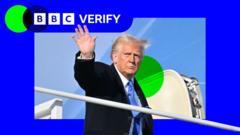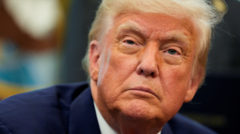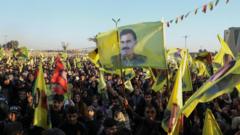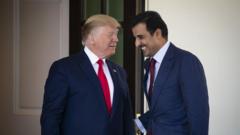**This article explores Qatar's efforts to reshape its global image, from being labeled a terrorism funder to hosting high-profile leaders, showcasing its political evolution and the implications of gift-giving in diplomacy.**
**Qatar's Diplomatic Resurgence: Trump Visit Highlights Transformation**

**Qatar's Diplomatic Resurgence: Trump Visit Highlights Transformation**
**Emirate's strategic charm offensive turns Trump, once a critic, into a supporter during his second term.**
In a noteworthy diplomatic turnaround, Sheikh Tamim bin Hamad al-Thani, the emir of Qatar, is set to host President Trump for a grand dinner at his Doha palace, marking a significant milestone in Qatar’s aggressive public relations campaign. The visit symbolizes a departure from Trump's past rhetoric, which branded Qatar as a "funder of terrorism." This change has been accompanied by reports that Qatar may offer Trump a luxury jetliner, a gift Trump deemed too good to refuse, despite criticisms from opposition Democrats and even some members of his own party.
This transformation reflects Qatar's extensive efforts to rebrand itself on the global stage. Over recent years, the emirate has invested significantly in lobbying initiatives, enlisting various high-profile figures, including current Attorney General Pam Bondi, to reshape its narrative in Washington and beyond. The pinnacle of this image revival was arguably its successful hosting of the FIFA World Cup in 2022, which cast the country in a more favorable light to the international community.
Experts observe that Qatar's current diplomatic strategies are not merely an attempt to restore its reputation but also signify its re-emergence as a key player in Middle Eastern politics. Simon Henderson from the Washington Institute for Near East Policy notes that Qatar's ability to mediate during crises—most notably its engagement during the recent Hamas-Israel conflict—further cements its role in international diplomacy.
As Trump embraces this apparent newfound friendship with Qatar, the implications for U.S. foreign policy and regional dynamics remain to be seen. How Qatar navigates this complex relationship while maintaining its interests amid criticism will be critical in shaping its future as a prominent player on the global stage.
This transformation reflects Qatar's extensive efforts to rebrand itself on the global stage. Over recent years, the emirate has invested significantly in lobbying initiatives, enlisting various high-profile figures, including current Attorney General Pam Bondi, to reshape its narrative in Washington and beyond. The pinnacle of this image revival was arguably its successful hosting of the FIFA World Cup in 2022, which cast the country in a more favorable light to the international community.
Experts observe that Qatar's current diplomatic strategies are not merely an attempt to restore its reputation but also signify its re-emergence as a key player in Middle Eastern politics. Simon Henderson from the Washington Institute for Near East Policy notes that Qatar's ability to mediate during crises—most notably its engagement during the recent Hamas-Israel conflict—further cements its role in international diplomacy.
As Trump embraces this apparent newfound friendship with Qatar, the implications for U.S. foreign policy and regional dynamics remain to be seen. How Qatar navigates this complex relationship while maintaining its interests amid criticism will be critical in shaping its future as a prominent player on the global stage.





















